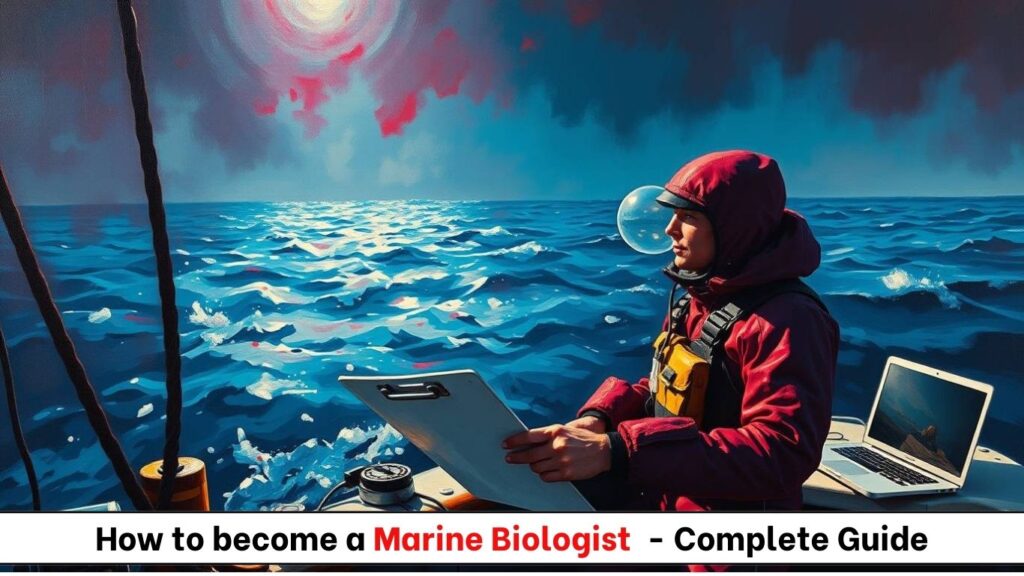
Introduction
Marine biology is the study of ocean ecosystems, marine organisms, and their interactions with the environment. A marine biologist explores everything from microscopic plankton to giant whales, coral reefs to deep-sea trenches. This field combines biology, chemistry, ecology, and conservation to protect marine life and sustain ocean resources.
If you’re passionate about the ocean, fascinated by aquatic life, or eager to combat climate change’s impact on seas, a career in marine biology could be your calling. This comprehensive guide covers:
- History of Marine Biology
- Roles and Responsibilities of a Marine Biologist
- Salary Expectations Worldwide
- Required Qualifications & Skills
- How to Get Started in Marine Biology
- Future Scope and Emerging Trends
Let’s dive deep into this exciting career!
History of Marine Biology
Humans have studied marine life for centuries, but modern marine biology emerged with scientific exploration:
Early Exploration (Ancient Times–1700s)
- Aristotle (4th century BCE): First recorded marine observations (classified fish, described octopus behavior).
- Polynesian Navigators: Understood ocean currents and marine life migrations.
- James Cook (1770s): Documented coral reefs and marine species during voyages.
Foundations of Marine Science (1800s–Early 1900s)
- Charles Darwin (1830s): Studied coral reef formation and barnacle biology.
- Challenger Expedition (1872–1876): First global oceanographic survey, discovering thousands of new species.
- Rachel Carson (1950s): Marine biologist and conservationist, author of The Sea Around Us.
Modern Marine Biology (1950s–Present)
- Jacques Cousteau (1960s): Pioneered scuba diving and underwater documentaries.
- Discovery of Hydrothermal Vents (1977): Revealed deep-sea ecosystems thriving without sunlight.
- Marine Conservation Movements (2000s): Focus on coral reef protection, plastic pollution, and sustainable fisheries.
Today, marine biologists use advanced technology like ROVs (remotely operated vehicles), DNA sequencing, and satellite tracking to study ocean life.
Roles and Responsibilities of a Marine Biologist
Marine biologists work in diverse fields, from research to policy-making:
1. Research & Academia
- Study marine species behavior, genetics, or physiology.
- Publish findings in journals like Marine Ecology Progress Series.
2. Conservation & Policy
- Work with NGOs (WWF, Oceana) to protect endangered species.
- Advise governments on sustainable fishing and marine protected areas.
3. Fisheries & Aquaculture
- Improve fish farming techniques (sustainable aquaculture).
- Combat overfishing and bycatch issues.
4. Marine Biotechnology
- Discover medical compounds from sponges, corals, or algae.
- Develop biofuels from marine microbes.
5. Ecotourism & Education
- Lead whale-watching tours or scuba-diving research expeditions.
- Teach marine science in schools or museums.
6. Climate Change Research
- Study ocean acidification’s impact on coral reefs.
- Monitor melting Arctic ecosystems.
Salary Expectations
Salaries vary by experience, location, and sector:
| Country | Entry-Level Salary (Annual) | Experienced Salary (Annual) |
|---|---|---|
| USA | $45,000 – $60,000 | $70,000 – $100,000+ |
| UK | £25,000 – £35,000 | £40,000 – £60,000 |
| Australia | AUD 60,000 – 80,000 | AUD 90,000 – 120,000 |
| India | ₹3,00,000 – ₹5,00,000 | ₹8,00,000 – ₹15,00,000+ |
Government and NGO jobs may pay less than private sector roles in aquaculture or biotech.
Qualifications & Skills Required
Educational Path
- Bachelor’s Degree: Marine biology, oceanography, or zoology.
- Master’s Degree: Specialize in marine conservation, fisheries, or biotechnology.
- PhD: Required for university research or high-level scientific roles.
Key Skills
- Scientific Diving: SCUBA certification (PADI/NAUI).
- Data Analysis: R, Python, GIS for mapping marine habitats.
- Fieldwork Resilience: Ability to work in harsh ocean conditions.
- Communication: Writing reports, grants, and public outreach.
Helpful Certifications
- Scientific Diver (AAUS certification)
- Marine Mammal Observer (for offshore industries)
How to Get Started in Marine Biology
Step 1: Build a Strong Foundation
- Take biology, chemistry, and math in high school.
- Volunteer at aquariums, beach cleanups, or marine rescue centers.
Step 2: Pursue a Degree
- Top Universities:
- USA: Scripps Institution, University of Miami.
- UK: University of Southampton, St Andrews.
- Australia: James Cook University (Great Barrier Reef access).
- India: CUSAT, Annamalai University.
Step 3: Gain Hands-On Experience
- Internships: NOAA, Woods Hole, or local marine labs.
- Research Assistantships: Assist professors in fieldwork.
Step 4: Network & Specialize
- Join societies (Society for Marine Mammalogy, MarineBio).
- Attend conferences (International Coral Reef Symposium).
Step 5: Career Pathways
- Field Researcher: Study sharks, corals, or plankton.
- Conservation Advocate: Work with Greenpeace or UNEP.
- Aquaculture Manager: Oversee sustainable fish farms.
Future Scope of Marine Biology
The field is evolving with urgent global challenges:
1. Ocean Conservation
- 30×30 Initiative: Protecting 30% of oceans by 2030.
- Coral Reef Restoration: Lab-grown coral transplants.
2. Deep-Sea Exploration
- ROV Discoveries: New species in unexplored trenches.
- Seafloor Mining Impacts: Studying ecological consequences.
3. Climate Change Mitigation
- Blue Carbon: Protecting seagrasses/mangroves that absorb CO₂.
- Arctic Research: Monitoring biodiversity shifts due to ice melt.
4. Marine Biotechnology
- Anti-Cancer Compounds: From sea sponges or cone snails.
- Algae Biofuels: Renewable energy alternatives.
5. Technology & AI
- eDNA Sampling: Detecting species from water samples.
- Drone Surveillance: Tracking illegal fishing activities.
Job Growth: Increasing demand in conservation, biotech, and policy (5–7% annual growth, U.S. BLS).
Conclusion
Marine biology is a career for adventurers, conservationists, and innovators. Whether you’re diving with sharks, lobbying for ocean protection, or discovering new species, your work helps preserve Earth’s blue heart.
Start your journey today:
- Snorkel or scuba dive to explore marine life.
- Enroll in a marine science course online (Coursera, edX).
- Follow marine biologists on social media for inspiration.
The ocean needs passionate protectors—will you answer the call?
Are you aspiring to be a marine biologist? Share your favorite sea creature below!
This guide equips you with everything needed to plunge into marine biology—from ancient seafarers to futuristic ocean tech. For personalized advice, connect with marine labs or conservation groups in your region. 🌊🐋













Post Comment